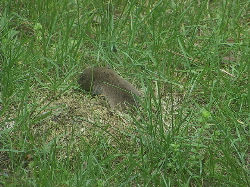
CLA members have been shocked to receive letters from Defra which detail plans to ban the use of strychnine (strychnine hydrochloride) from 1 September next year (2006).
Whilst recognising that strychnine is a dangerous chemical that is banned in other EU states, CLA is concerned that the broad scale lush pasture of the British countryside is a breeding ground for moles and thus the UK needs to retain this effective method.
Joanna Hilditch, a CLA member who farms and runs luxury holiday lets in Herefordshire said, "Our pest control company has warned us that when strychnine disappears we will be faced with serious mole problems as there is no other financially viable route for elimination of this pest. In the past, when supplies have been short and we have had to wait for long periods of time until the product was available, the problem became well nigh unbearable in our permanent pasture."
Moles can be controlled in gardens and amenity grounds by other means, but at field scale level, strychnine is an important tool which must be maintained for use in appropriate and limited circumstances, in accordance with the existing Defra licensing regime.
CLA President, Mark Hudson said "I believe that strychnine is the only effective poison to control moles. If so we will be in for an explosion of moles when strychnine is banned and this will be particularly detrimental for livestock farmers. Soil contamination in silage will be the biggest problem and that can lead to livestock deaths.
"We regard the existing licensing regime as appropriate to deal with the potential for wildlife crime. Criminals will use any means to hand, and simply withdrawing an important and useful land management tool will not, in our view, reduce the impact of criminal activities.
"The Defra proposals arise as a result of two EU directives. We will be calling on Defra to secure a derogation for a continued safe and licensed use of strychnine in the limited circumstances where it is necessary."
